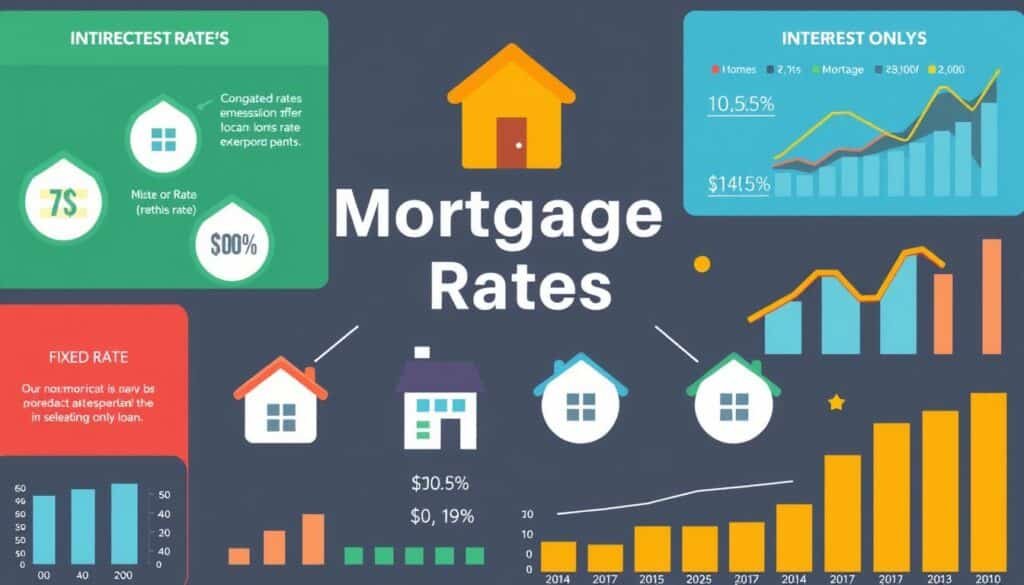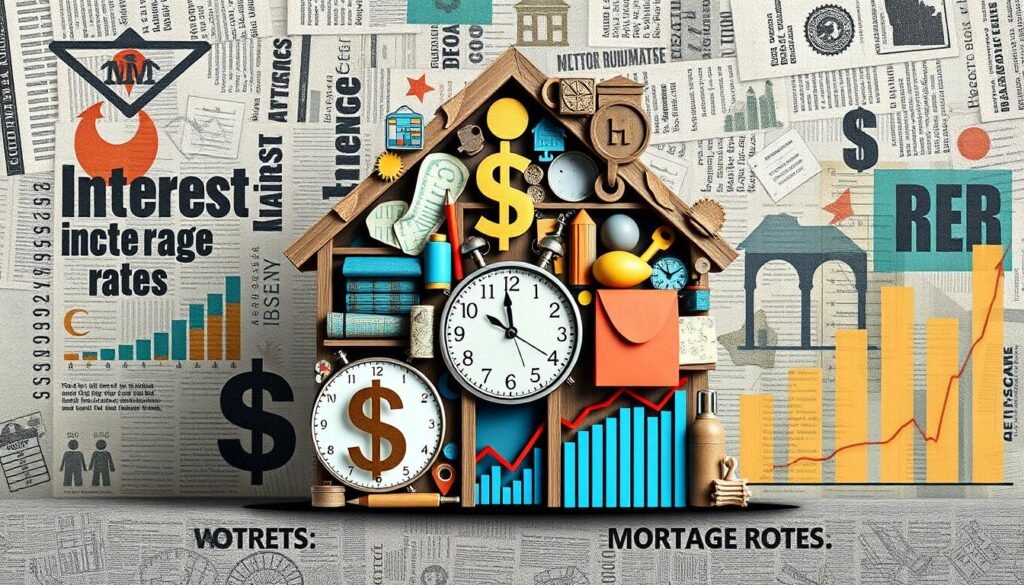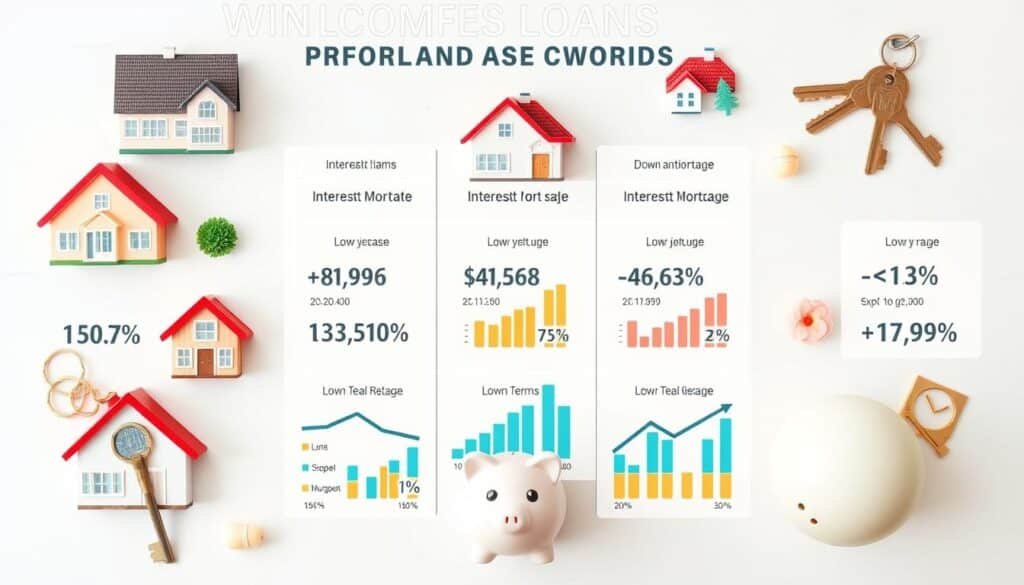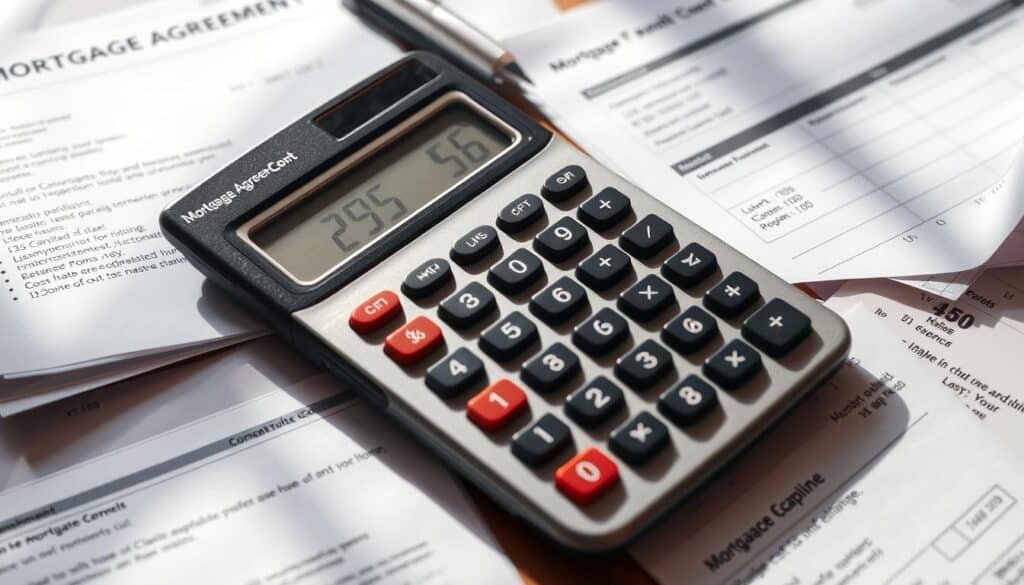Table of Contents
ToggleHome Loan Us Bank Finding the best mortgage deal can seem hard in today’s home loan market. But, with the right information, you can make smart choices. This guide will help you understand mortgage rates and options. It’s all about making your dream of owning a home come true.
Key Takeaways
- The Federal Reserve has been cutting interest rates to combat inflation, leading to a decrease in mortgage rates.
- Experts predict further rate drops in the coming months, making it an opportune time to explore mortgage options.
- Lenders may offer mortgage rate modifications to retain existing customers and provide them with lower rates.
- Homebuyers should focus on improving their credit scores and shopping around for the best mortgage deals.
- Understanding closing costs and fees is crucial to budgeting for the total cost of your home loan.
Today’s Mortgage Rates and Trends
Recently, mortgage rates in the U.S. have seen some changes. The average 30-year fixed mortgage rate is now 6.52%, up 0.32% from last week. The 15-year fixed mortgage rate has also gone up, now at 5.81%, a 0.39% increase.
The adjustable-rate mortgage (ARM) market has seen changes too. The 5/1 ARM now averages 5.83%, a 0.14% increase from last week. The average rate for the benchmark jumbo mortgage has also gone up to 6.57%, a 0.21% increase.
Mortgage Rate Trends Over Time
Mortgage rates have been on a wild ride in the last year. Rates hit a historic low of 2.65% for 30-year fixed mortgages in January 2021. But in 2022, rates started to rise again. Recent actions by the Federal Reserve, including a mid-September interest rate cut, have brought hopes for a rate drop as we near the end of 2024 and into 2025.
Analysts say nearly 3 million outstanding mortgages now have rates at or above 6.75%. This opens up refinancing opportunities for homeowners. Also, 47% of potential homebuyers are looking for rates under 5% to buy a home in 2024. This shows strong demand for more affordable mortgage options.
| Loan Type | Current Rate | Change from Previous Week |
|---|---|---|
| 30-year fixed | 6.52% | +0.32% |
| 15-year fixed | 5.81% | +0.39% |
| 5/1 ARM | 5.83% | +0.14% |
| 30-year fixed jumbo | 6.57% | +0.21% |
“Lower mortgage rates could continue into 2025, following the Fed’s rate cuts and economic projections.”
Comparing Different Mortgage Types

Prospective borrowers have many mortgage options. The 30-year fixed-rate mortgage and the 15-year fixed-rate mortgage are two popular ones. Knowing the differences between them helps homebuyers make the right choice.
30-Year Fixed Mortgage Rates
The 30-year fixed-rate mortgage is the most common in the U.S. In September 2024, its average rate was 5.74%, Zillow reports. This loan has lower monthly payments, appealing to many first-time and move-up buyers.
15-Year Fixed Mortgage Rates
15-year fixed-rate mortgages have lower interest rates, averaging 5.01% in September 2024. Monthly payments are higher, but borrowers save on interest over time. This is beneficial for those who can handle the higher costs.
| Loan Type | Average Rate | Monthly Payment* | Total Interest Paid |
|---|---|---|---|
| 30-Year Fixed | 5.74% | $1,786 | $193,760 |
| 15-Year Fixed | 5.01% | $2,273 | $68,940 |
*Assuming a $300,000 home loan amount
Homebuyers must think about their finances, goals, and budget when choosing between these mortgages. The right choice depends on affordability, risk comfort, and the desire to pay off the loan quickly.
Factors Impacting Your Mortgage Rate

Many things can change the interest rate on your mortgage. Your credit score, how much debt you have, and how much you owe on your home are important. Lenders look at these to see if you’re a good risk.
For example, people with credit scores between 620 and 639 might pay about 6.575% on a $300,000 mortgage for 30 years. But, those with scores over 760 could get a rate as low as 6.547%. The type of loan, how long you want to borrow, what kind of property, and where it is can also affect your rate.
If you’re not happy with your mortgage rate, you might want to look into a loan modification. This could help you avoid default and make your payments more manageable.
Knowing about mortgage rate trends and what affects them can help you make better choices. This way, you can get the best deal on your home loan.
| Factors | Impact on Mortgage Rate |
|---|---|
| Credit Score | Higher credit scores generally qualify for lower interest rates |
| Debt-to-Income Ratio | Lower debt-to-income ratios can lead to more favorable rates |
| Loan-to-Value Ratio | Higher down payments result in lower loan-to-value ratios and better rates |
| Loan Type | Conventional, FHA, VA, and jumbo loans may have different rate structures |
| Loan Term | Shorter loan terms, like 15-year mortgages, typically have lower rates |
| Property Type | Rates may vary for primary residences, second homes, or investment properties |
| Location | Mortgage rates can differ based on regional market conditions |
Understanding these factors can help you navigate the mortgage world better. You can work with your lender to find the best rate for your situation.
Home Loan Us Bank: Loan Options and Requirements

U.S. Bank has many mortgage options for different borrowers. They offer conventional loans and government-backed programs. This helps make buying a home easier for everyone.
Conventional Loan Programs
Conventional loans are a top choice for many. They need a good credit score and a big down payment, usually 20% to 30%. But, they often have lower interest rates. U.S. Bank’s conventional loans let you pick between fixed and adjustable rates, based on your financial plans.
Government-Backed Loan Programs
U.S. Bank also has FHA and VA loans for those who can’t meet conventional loan standards. These loans have easier credit score and down payment rules. FHA loans start at 3.5% down, and VA loans have no down payment for military and veterans.
U.S. Bank’s mortgage experts will help you choose the right loan. They focus on great customer service and competitive rates. This makes buying a home easier and less stressful.
“At U.S. Bank, we understand that every borrower’s financial situation is unique, and that’s why we offer a wide range of loan programs to ensure you find the right fit,” said a U.S. Bank mortgage specialist.
Steps to Getting the Best Mortgage Deal

Getting the best mortgage deal takes a few steps. First, work on improving your credit score. Lenders like scores of 720 or higher for better rates. Also, keep your debt-to-income ratio under 43%.
Improving Your Credit Score
To boost your credit score, try these tips:
- Check your credit report for errors and fix them.
- Always pay bills on time, including credit cards.
- Keep credit card balances under 30% of the limit.
- Don’t open too many new credit accounts, as it can hurt your score.
Shopping Around for Lenders
After improving your credit, start looking for the best mortgage rates. Compare offers from at least three lenders. This includes banks, credit unions, and mortgage brokers.
Look at the Annual Percentage Rate (APR) when comparing. It shows the interest rate and fees. Also, check out government-backed loans like FHA and VA for better terms.
Talking to a mortgage loan officer can help. They guide you through loan options and ensure you get the best deal.
Researching and comparing lenders can save you a lot. By following these steps, you’ll find the best mortgage for your needs.
Understanding Closing Costs and Fees

When you get a mortgage, you need to think about more than just the interest rate. You also have to consider the closing costs and fees. These can include things like origination fees, discount points, appraisal fees, title insurance, and prepaid expenses. Knowing what to expect helps you budget and make a smart choice.
To understand the total cost of your loan, ask for a loan estimate from your lender. This document will show you the estimated closing costs. It lets you compare offers from different lenders. Also, the closing disclosure you get before closing will give you the final numbers. This ensures there are no surprises on closing day.
Some lenders, like Home Loan Us Bank, offer homebuyer assistance programs. These programs help cover some of the closing costs. Talking to a mortgage loan officer can help you understand your options. They can also help you find the best deal on your home loan.
“Understanding the closing costs and fees associated with a mortgage is crucial for homebuyers to make an informed decision and budget accordingly.”
Learning about the different expenses in the mortgage process prepares you for the home-buying journey. It helps you find the best financing option for your needs.
Also Read : Home Loan Vs Mortgage: A Comprehensive Comparison
Conclusion
This article has given homebuyers a detailed look at mortgage options and resources from U.S. Bank. We’ve talked about the current mortgage rates and the differences between 30-year and 15-year fixed loans. We also covered how various factors can affect your mortgage rate.
Understanding loan programs, eligibility, and how to get the best deal is key. Now, readers have the knowledge to confidently navigate the home-buying journey.
We shared real experiences from U.S. Bank customers like Daniel R. from San Antonio and Kayla C. from The Woodlands. They praised the bank’s mortgage specialists for their great communication and support. These stories show U.S. Bank’s dedication to a smooth and personalized mortgage process.
With U.S. Bank’s help, homebuyers can confidently explore mortgage options. They can secure competitive rates and find the right loan for their needs and goals. This article has given a summary of key points and guidance for all homebuyers, whether it’s your first time or you’re a seasoned homeowner.
FAQs
Q: What are the best first-time homebuyer programs available through U.S. Bank?
A: U.S. Bank offers various first-time homebuyer programs, including conventional fixed-rate loans, VA loans, and Federal Housing Administration loans, which can provide flexible options and payment assistance to help you secure your dream home.
Q: How can I start my home-buying journey with U.S. Bank?
A: To start your home-buying journey, you can contact a mortgage loan officer at U.S. Bank who will guide you through the process, discuss your options, and help you understand the necessary disclosures and requirements.
Q: What is a conventional fixed-rate loan, and how does it work?
A: A conventional fixed-rate loan is a type of mortgage where the interest rate remains constant throughout the life of the loan, ensuring predictable monthly payments. This type of loan is commonly used by first-time homebuyers.
Q: Are there any payment assistance options for first-time homebuyers?
A: Yes, U.S. Bank offers various payment assistance programs that can help first-time homebuyers manage their monthly payments. These programs may include grants or second mortgages to cover down payments or closing costs.
Q: What should I know about VA loans for first-time homebuyers?
A: VA loans are designed for eligible veterans and active-duty service members. They offer no down payment options and favorable terms, making them an excellent choice for first-time homebuyers looking to take advantage of their benefits.
Q: How do I calculate my estimated monthly payment and APR for a home mortgage?
A: To calculate your estimated monthly payment and APR, you can use a mortgage calculator available on the U.S. Bank website. This tool takes into account the total loan amount, interest rate, and terms of the loan, including taxes and insurance premiums.
Q: What are jumbo loans, and who are they best suited for?
A: Jumbo loans are mortgages that exceed the conforming loan limits set by the Federal Housing Finance Agency. They are best suited for buyers looking to purchase high-value homes that fall outside the conventional loan limits.
Q: What does the monthly payment for a home loan typically include?
A: The monthly payment for a home loan typically includes principal and interest, but it may not include amounts for taxes and insurance. Homebuyers should ensure they know all components included in their total monthly payment.
Q: How can I ensure I choose the right mortgage option for my first home?
A: To choose the right mortgage option for your first home, consider consulting with a mortgage loan officer who can provide personalized advice based on your financial situation, home-buying goals, and available loan programs.




